For folks who remember Bullfrog and have played Syndicate, Satellite Reign is pretty much the same game with nicer graphics, new mechanics and slightly deeper gameplay. For everyone else – strap in: Pig's story-time is about to begin...
Back in the '90s, Bullfrog Productions Limited was a much-beloved developer that gave us gems like Populous, Powermonger, Magic Carpet and Dungeon Keeper. Helmed by Peter Molyneux (who would later found Lionhead Studios and give us the hilarious/unique/decidedly-odd Black & White and the Fable series), the studio was renowned for its Original Ideas and completely different take on What a Computer Game Could Be. While everyone else was deepening the ruts of existing genres (like action games, shooters or platformers), Bullfrog seemed really keen on Letting Players Play God.
Most often, this meant that – rather than directly controlling a character on screen – the player would be a nebulous overseer able to influence the world without having a representation in it. Bullfrog did this schtick very well, but nowhere was it so starkly different than in 1993's Syndicate.
A complete departure from the studio's preoccupation with myth, deities and the fantasy realm, Syndicate was set in a bleak, gritty, cyberpunk future controlled by corporations large enough to dictate the course of the entire world. To enforce their will, each corp had its own army of "drones" (people-turned-marionettes chipped for direct remote control) and – in Syndicate – you assumed the role of a drone handler, who traveled the world and "influenced" it at (once removed) gun point to ensure the dominance of your employer.
The game was played from an isometric perspective and gave you control of up to four drones, each of which could be augmented with armor and cybernetic limbs and equipped to best suit a particular task. While Syndicate offered a few distinct mission types, essentially they all boiled down to: 1) shooting and 2) persuading (i.e. hacking the chip of some poor schmuck to "convince" them to work for your corporation). While not without its challenges, Syndicate wasn't exactly a complex game – but that didn't stop it from becoming incredibly popular (check out any list of most influential games and Syndicate will be on it — guaranteed).
Thanks to its popularity, Syndicate got an expansion pack (called American Revolt) and a sequel (Syndicate Wars), which upgraded the graphics to full 3D and altered the plot into a conflict between a single corporation, called EuroCorp, and an enigmatic cult called The Church of the New Epoch. The IP seemed destined to thrive, but then – in 1995 – EA gobbled-up Bullfrog; Molyneux left in '97 and the company quickly went from being One of the Most Original Devs Around to, in the words of Mark Healy (the lead artist for Dungeon Keeper), "more like a chicken factory" and "being assimilated by the Borg."
Because EA are greedy bastards, they tried to capitalize on Syndicate's popularity with a "spiritual sequel" in 2012 (which was also, confusingly, called Syndicate); but the "reboot" – being an FPS – had little in common with the original and (a few gameplay aspects aside) wasn't that well received...
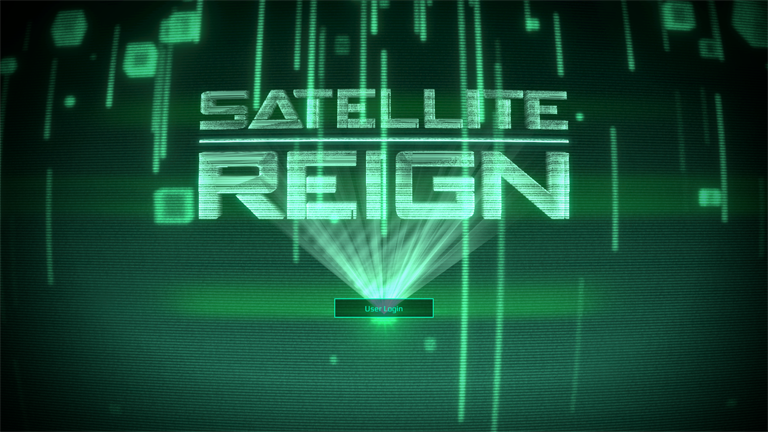
The effort to cash-in on a beloved title upset Mike Diskett (the producer and lead programmer of the original Syndicate) to such an extent, he decided to make a "proper" sequel himself. Banding together with four other industry veterans, he formed 5 Lives Studios and successfully kickstarted Satellite Reign in 2015, finally giving Syndicate fans the sequel they deserved.
Same but deeper
In terms of design and gameplay, Satellite Reign follows the Syndicate formula to a tee – with slight improvements.
The presentation is slick and shiny, with vibrant graphics and excellent sound and music which will be instantly familiar to previous Syndicate players (composed, as they are, by Russell Shaw, who also scored Syndicate – and, seemingly, every other Bullfrog game).
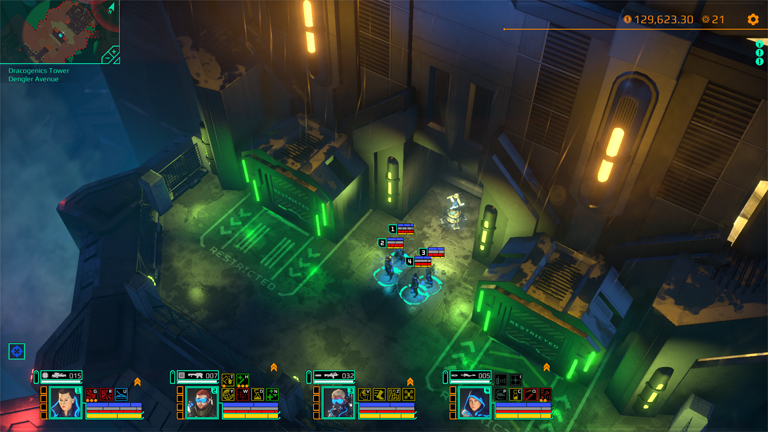
You observe the neon-infused, rain-slicked game world of The City from a fixed isometric perspective that now shimmies around convincingly (to reflect the lore of your viewpoint being a live satellite feed). You control your team of four drones with the mouse and a (fairly complex) list of keyboard shortcuts. Each of The City's sectors have fixed objectives that advance the plot and give you access to further areas of the game. In between objectives, you can assign scientists to research more advanced technologies that may give your drones the edge in tackling the competition.
The main difference, then, is that your drones can gain experience, level-up and have skills and specialized classes; and that objectives require a more puzzle-solving approach than either of the previous games.
A dash of RPG
Your drones can be a Soldier, Support, Hacker or Infiltrator.
The Soldier, as the name implies, is the team's designated damage-sponge and death-dealer. They can carry the most, have the most health and a lot of abilities that augment their damage output. But far from being a simple grunt, Soldiers are also the only class that can Hardwire mechanical obstacles, force doors open and use explosives to knock out pesky systems.
The Support's main role is healing, boosting team stats and using a World Scan ability to reveal how security systems are wired (and where they can best be interrupted). They're kind of a "jack of all trades" character that, while not overly specialized, can double as an extra soldier or boost the output of your other drones.
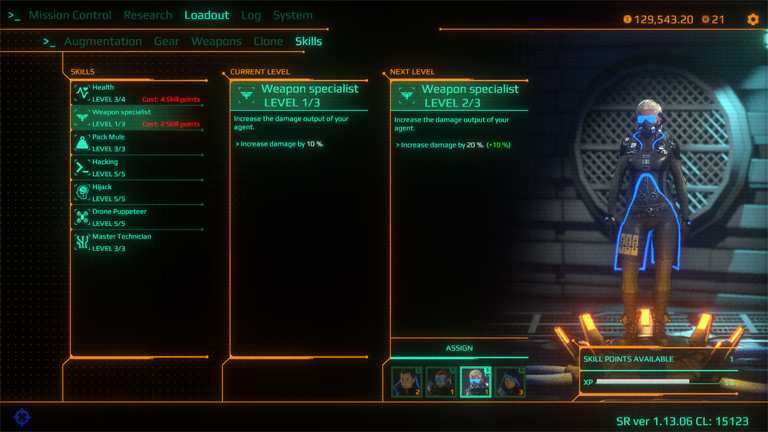
The Hacker can operate (mechanical) drones remotely, hack other characters to control them, steal cash, open locks and even boost the team's shields for a time. In terms of overall usefulness, Hackers are probably the most important class in the game and a good one can put even the best-equipped Soldier to shame by simply taking over four or five other Soldiers and marching in their midst like the CO of a brainwashed little army.
If the Hacker is the most important class, then the Infiltrator is the most useful. Between their cloak, the ability to insta-kill pretty much any opponent and their knack for accessing hard-to-reach places by their lonesome, the Infiltrator will often make you wonder why the other characters bother tagging along...
The right approach
While game objectives are designed with multiple viable approaches, in reality stealth is almost always the best choice. There are a handful of places where you can brute-force your way through, but – in almost every instance – you will be outclassed, outnumbered and overmatched by your opponents and trying to charge into battle will see you quickly overwhelmed.
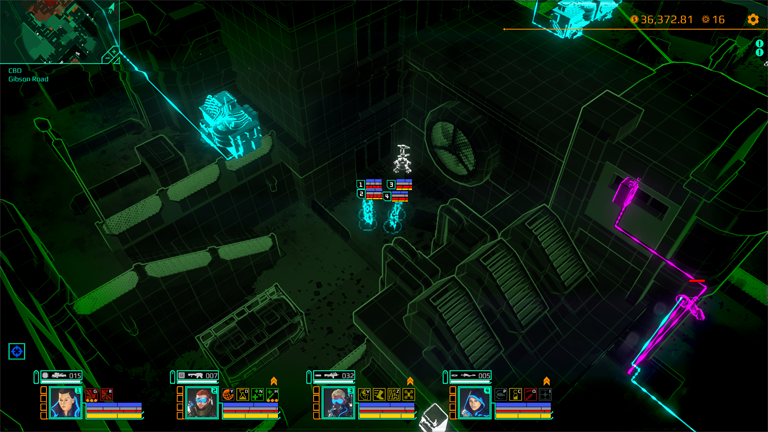
Doing things quietly takes some forethought and planning and is probably the most fun Satellite Reign has on offer. Will you shut down a power line so that your agents can use it as a zip line? Or close a valve that'll cut off the flow of poison gas to an area you couldn't otherwise access? Snipe sentries to allow your team silent egress into a restricted zone? Or simply take control of a guard and have him open the front door for you?
While access to areas is limited to a set number of paths, it does offer sufficient options to give you some leeway in your approach and seeing a plan come together as anticipated is a very satisfying experience.
Overwhelming
Unfortunately, unless you happen to be the pro-gamer sort that can instantly recall keyboard shortcuts, Satellite Reign's canny compartmentalization of responsibilities is also it's biggest flaw. Putting together a successful breach often requires you to have drones far removed from each other and – as you are limited to seeing only one of them at a time and their programmed behavior isn't particularly bright – your carefully concocted plans are always one random variable away from collapsing into utter chaos.
While you can limit the amount of drones you bring on an operation, having to do so kinda underlines the fact that player control isn't easy or intuitive.
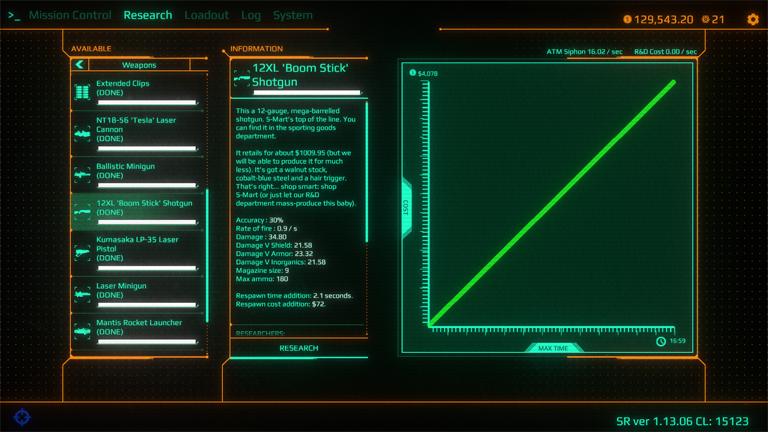
What's worse, on certain objectives, the game kind of crowbars-in the use of a specific class that you might not want to be using (the most annoying manifestation of which are missions where you'll get 3/4's of the way in only to find progress blocked by something that can only be Hardwired).
Having broader skill pools and no distinct classes would have been the better approach to smooth gameplay, allowing the player to customize their team to suit any play style. Being forced to use four distinct classes simply doesn't work as well in practice as it may have appeared during the game's design.
Stronger together?
To overcome the compartmentalization flaw, Satellite Reign offers 4-player co-op, allowing – in theory – individual control of every drone for seamless teamwork. I say "in theory" because it doesn't really solve the core issue.
Even if you are able to find three other people to play an eight year old game (most I could find was one); and assuming the four of you can reach the sort of worldess gestalt plateau that will allow you to anticipate each other and execute planned maneuvers flawlessly, co-op doesn't fix the fact that two of you will usually feel a bit superfluous.
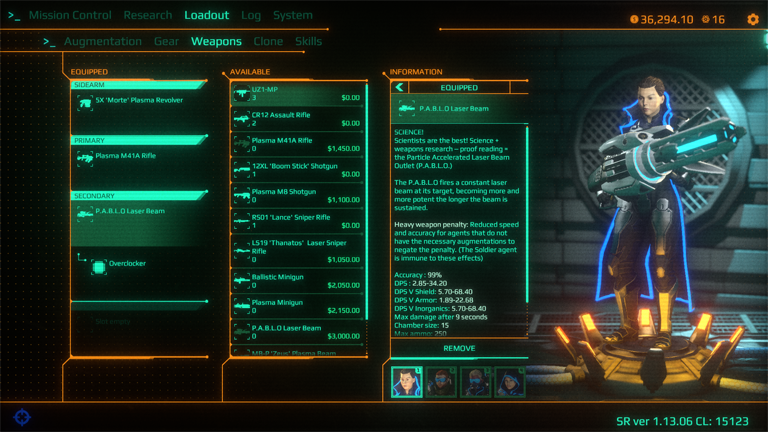
Because the Hacker and Infiltrator have so many useful core skills, the pair is usually enough to solve any situation (aforementioned crowbar instances aside). And because the Soldier and Support are more combat oriented (and prolonged combat, more often than not, is simply untenable), they frequently find themselves twiddling augmented thumbs on the sidelines with nothing to do.
Summation
A few bugs and flaws aside (and, okay, the ending – which is a bit too "middle finger-y" for a linear narrative with zero player agency), Satellite Reign is a pretty solid game. The City exploration and optional side-missions paired with research, recruitment, skill development and the ability to vary your tactics from one mission to the next make for a satisfying experience only slightly marred by design shortfalls.
If you are a longtime Syndicate fan, this is an absolute must-have (moreso if you're in touch with other likeminded players who'd go in for a co-op session); but even if you've never heard of the original, but enjoy isometric tactical games, Satellite Reign won't shortchange you on great design, production and many, many hours of corporate "negotiation" fun.
Pig Reccomends:
- -even though, by modern standards, they offer pretty basic gameplay, Syndicate and Syndicate Wars remain eminently playable and a lot of fun; both are available on GoG (with Syndicate bundled with American Revolt as Syndicate Plus);
